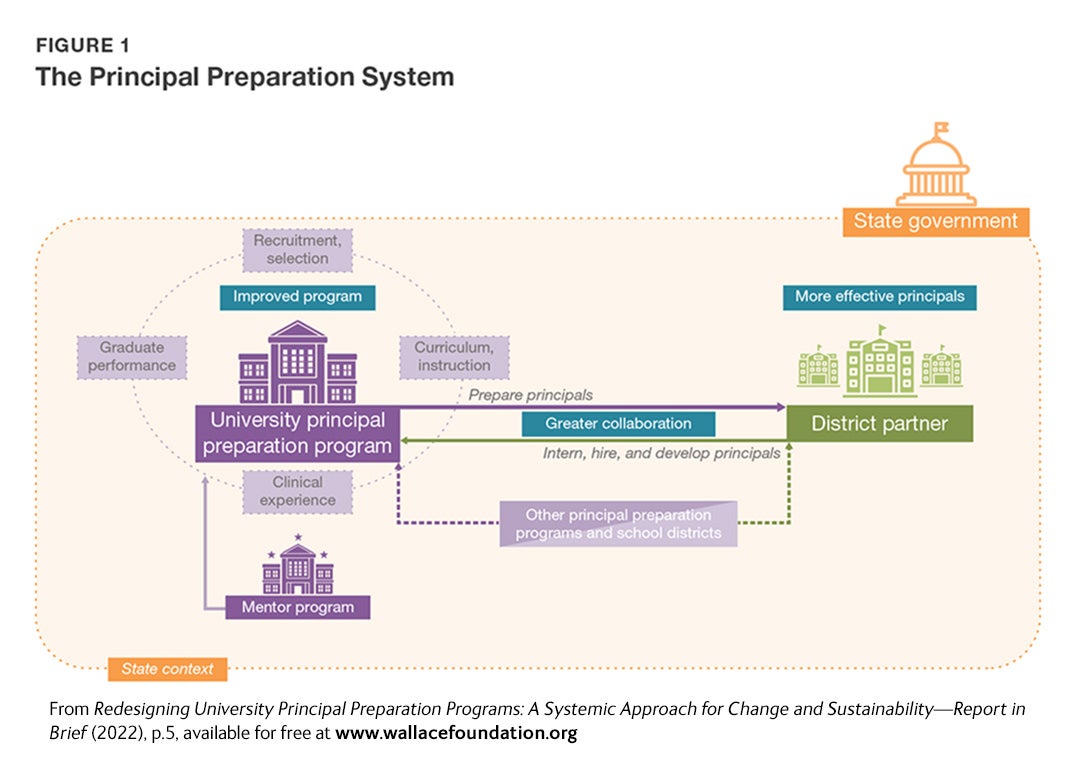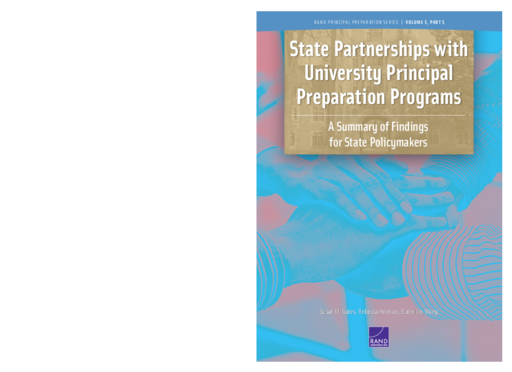Breadcrumb
- Wallace
- Reports
- State Partnerships With Universi...
State Partnerships With University Principal Preparation Programs
Summary of Findings for State Policymakers

- Author(s)
- Susan M. Gates, Rebecca Herman, and Elaine Lin Wang
- Publisher(s)
- RAND Corporation
- DOI Link
- https://doi.org/10.7249/RRA413-7
Summary
How we did this
For the study from which this report is drawn, researchers completed more than 630 interviews, focus groups, and observations from 2017 to 2021. All seven redesign efforts in the University Principal Preparation Program Initiative were examined. That meant exploring the work of university programs, district partners, state partners, and mentor programs. This report looks at key findings pertaining to state policy.
State policymakers can play an important role in improving principal preparation. That’s one of the major takeaways from this brief.
Research has shown that school principals matter greatly to teaching and learning. Yet university principal training has not kept pace with the job’s growing demands. The Wallace Foundation launched an initiative in 2016 to improve principal preparation. Seven universities in seven states participated in the University Principal Preparation Initiative. Universities worked with districts and states to better align their principal preparation programs with evidence-based practices.
This brief summarizes key lessons for state organizations from the RAND Corporation’s full five-year study of the effort. The researchers found that universities collaborating with state organizations and others can meaningfully redesign principal preparation programs.
The seven participating universities were:
- Albany State University, Ga.
- University of Connecticut
- Florida Atlantic University
- North Carolina State University
- San Diego State University
- Virginia State University
- Western Kentucky University.
How States Promoted Principal Quality
These are the some of the notable ways that participating states worked to advance principal preparation:
State education agencies used school leadership standards to align and strengthen policies. All participating states had principal or leadership standards. Most revised those standards for some or all school leaders. They then used those standards to create coherent policies to strengthen school leadership. Key areas that states strengthened were:
- Principal licensure requirements
- University principal program accreditation and oversight
- Professional development for licensure renewal.
States mainly aimed to support rather than mandate change. States acted on guidance from districts and preparation programs to provide resources. When policy changes were needed, states coupled mandates with support. Districts and programs received mandates more favorably when they were evidence-based. Mandates were also better regarded when they were backed with oversight and accountability.
States contributed to a culture of collaboration across the principal preparation system. Practices included:
- Hosting stakeholder convenings
- Creating professional learning communities
- Sharing examples of strong practices used in participating programs with others
- Creating state-level task forces or working groups.
State organizations promoted partnerships between districts and university principal preparation programs. States provided practical guidance on how to structure partnerships between programs and districts. They also shared lessons learned during the initiative statewide to help other partnerships.
Key Takeaways
- The Wallace Foundation launched an initiative in 2016 to improve principal preparation. Seven universities in seven states participated. Universities worked with districts and states to better align their principal preparation programs with evidence-based practices. This brief summarizes key lessons for state organizations.
- State education agencies used school leadership standards to align and strengthen policies. Most states revised their standards. They then used those standards to create coherent policies to strengthen school leadership. Key areas that states strengthened were:
- Principal licensure requirements
- University principal program accreditation and oversight
- Professional development for licensure renewal.
- States mainly aimed to support rather than mandate change. When policy changes were needed, mandates were coupled with support. Mandates were better received when they were evidence based. Oversight and accountability for mandates were also valued.
- States contributed to a culture of collaboration across the principal preparation system. Practices included hosting convenings and state-level task forces.
- State organizations shared practical guidance with districts and university programs on how to structure their partnerships.
Visualizations

Briefing
Wallace Foundation President Will Miller on effective school leadership, and political scientist Paul Manna on how states could foster it












